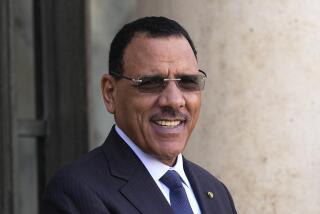Negativism in Nigeria : Promising movement toward democracy is suddenly in crisis
- Share via
Like many African dictators before him, Nigerian Gen. Ibrahim B. Babangida has reneged on his many promises to convert his military rule to a civilian government. To keep himself in power and perks, he has canceled the results of last month’s presidential election.
That election, a major milestone in the move toward democracy in Africa’s most populous nation, was conducted fairly, according to impartial observers. On the basis of votes recorded before the count was interrupted, billionaire businessman and newspaper publisher Moshood Abiola beat his wealthy opponent, Bashir Tofa. But Babangida annulled the election even though he had handpicked both candidates: He simply can’t let go.
Nigerians refuse to accept this rebuke to democracy. Thirty military officers, including a general who has been an ally of Babangida, have resigned in protest. A general strike is planned. Additional protests are taking place in regions dominated by Abiola’s tribe, the Yoruba.
The tribal connection is worrisome. If the protests continue along tribal or regional lines, Nigeria could suffer the deadly anarchy that threatens Somalia, Sudan and, much closer to home, Liberia. Nigerians who remember the 1967 Biafran civil war need no other reminders of the tragedy of pitting Muslim against Christian and Yoruba against Ibo. The death toll in that internecine conflict topped 1 million.
Gen. Babangida promises to authorize a new election and to step down by Aug. 27, but few believe him. The June election was the third time he promised Nigerians an opportunity to vote. Now, he has barred both candidates from future campaigns for office.
The West has every reason to worry. Nigeria, by sheer size and relative affluence, is a trendsetter in Africa. By thwarting democracy there, Babangida could chill pro-democracy challenges to military rule elsewhere on the continent. The Clinton Administration rightly has cut off assistance, as has Britain, the former colonial ruler of Nigeria. Those losses represent a pittance when compared to oil-rich Nigeria’s $5.4-billion gross domestic product. The real pressures for democracy must come from within.
More to Read
Sign up for Essential California
The most important California stories and recommendations in your inbox every morning.
You may occasionally receive promotional content from the Los Angeles Times.













